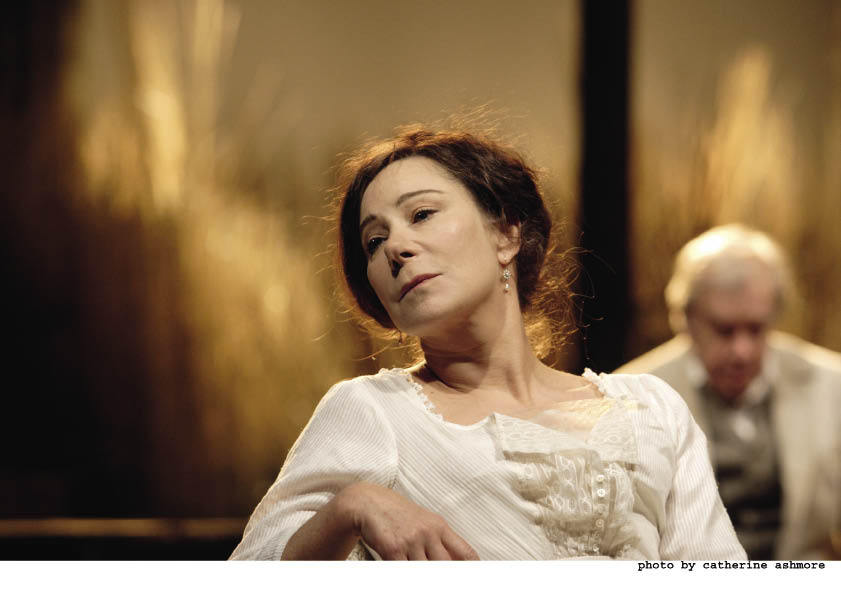The Cherry Orchard is Chekhov’s barmiest and bleakest play.
The Cherry Orchard is Chekhov’s barmiest and bleakest play. It’s also his richest. The madness starts immediately. To set the opening scene of a sprawling family drama at four o’clock in the morning seems eccentric to the point of rashness but Chekhov is a master of his craft. A wealthy widow, Ranyevskaya, has arrived at her estate after a long trip from Paris and she’s greeted by staff and relatives who’ve waited up all night to help her entourage settle into the house. This gives the scene a fragmented dynamism which allows a dozen characters and relationships to be gradually elucidated in conditions of perfect naturalism.
The estate is about to be swallowed up by greedy debtors and a prosperous merchant, Lopakhin, has come up with a rescue plan. By felling the orchard and building holiday homes in its place he can offer the bankrupt family not just security but also lasting prosperity. They’ll be well off. Ranyevskaya, and her loveably oafish brother Gaev, won’t dream of sacrificing their ancestral lands to become the Pontins of imperial Russia.
This activates the plot, a treasure hunt in reverse, in which fleet-footed enterprise is pitched against sluggish, respectable Old Money. The family’s salvation may lie in a successful marriage. Two daughters are in play. The embittered, overworked Varya is attracted to Lopakhin but can’t elicit a proposal from him, while the beautiful millionaire-magnet Anya seems destined to run off with Trofimov, an inspired waster who talks like a metaphysical poet but dresses like a tramp.
Contradictions abound. Lopakhin, the only materially successful character, is the most spiritually tormented. Gaev, a ridiculous loser, seems permanently animated by happiness while Trofimov, clearly a genius, is incapable of turning his dazzling intellect to any useful purpose. Conleth Hill gives Lopakhin plenty of sardonic wit, and James Laurenson’s rumpled, bumbling Gaev is a pleasure to watch.
The lead is played by Zoë Wanamaker, an actress whose central appeal I’ve never successfully located. She isn’t a comedienne, particularly, or a tragedienne either, but a sort of intermedienne, her presence not helped by those Emin-ish eyes and a voice that lacks power or expressive variety. Her face is of the sort that moved a kinder age to euphemisms, ‘characterful’, ‘experienced’, perhaps. At times she looks like an aggrieved pixie. But she overcomes all these shortcomings and dominates the action with complete assurance here. Ranyevskaya could easily be a straw figure, a soft-touch widow surrounded by cads and spongers, so it takes a special kind of warmth and ebullience to make us feel involved in her self-inflicted woes.
Wanamaker gets excellent support from Claudie Blakley as a chapped and bitten Varya, and from Sarah Woodward playing Charlotta, an Italian conjuror with a German accent, whose ability to perform cheap card tricks guarantees her a place in Ranyevskaya’s dysfunctional entourage. The final paradox is that after three hours in the company of these doomed failures one comes skipping out of the theatre with a heart full of joy. An absolutely exemplary production. I couldn’t recommend it enough.
The Leicester Square Theatre is playing host to an eccentric satire by the excellent Justin Butcher. Erudite and sophisticated, but never averse to a spot of cheap populism, Butcher likes to graft a topical subject on to a classic text and produce knockabout farce. His new show has opened at the very moment when its theme, the royal wedding, is losing its place among our fascinations. The convoluted plot follows an anxious Wills, overcome by his hereditary stammer, as he goes into hiding and asks a Romanian gardener named Romulus to take his place at the Abbey. Crowds of literary references jump all over this storyline and, in the mass brawl that follows, nothing intelligible emerges. Wills is portrayed as a trustafarian halfwit and his bride as a Ritz-ditz obsessed with jewellery and couture. Neither caricature comes close to the target. And Butcher seems more interested in the obscure figure of Romulus and his oppressed fellow migrants than in the royal family.
Much ire, and little wit, is directed against a stage Irishman named Mick Murphy. Gestures like that suggest that this is an ill-advised rush-job. Occasionally, there’s a flash of real comedy. ‘I want a drink,’ says Prince Philip. ‘Get me an ouzo.’ And Butcher has lots of fun taking apart Huw Edwards and his lumbering BBC commentary. ‘This is an ancient ceremony,’ lilts the Welshman, ‘richly invested with historical and religious symbolism but I’m going to ignore all that because here come the Beckhams.’ Early start-times — 6 p.m. on Thursdays and Saturdays — aren’t doing this show any favours. Topical satire works better in the loose and lairy atmosphere of midnight.







Comments